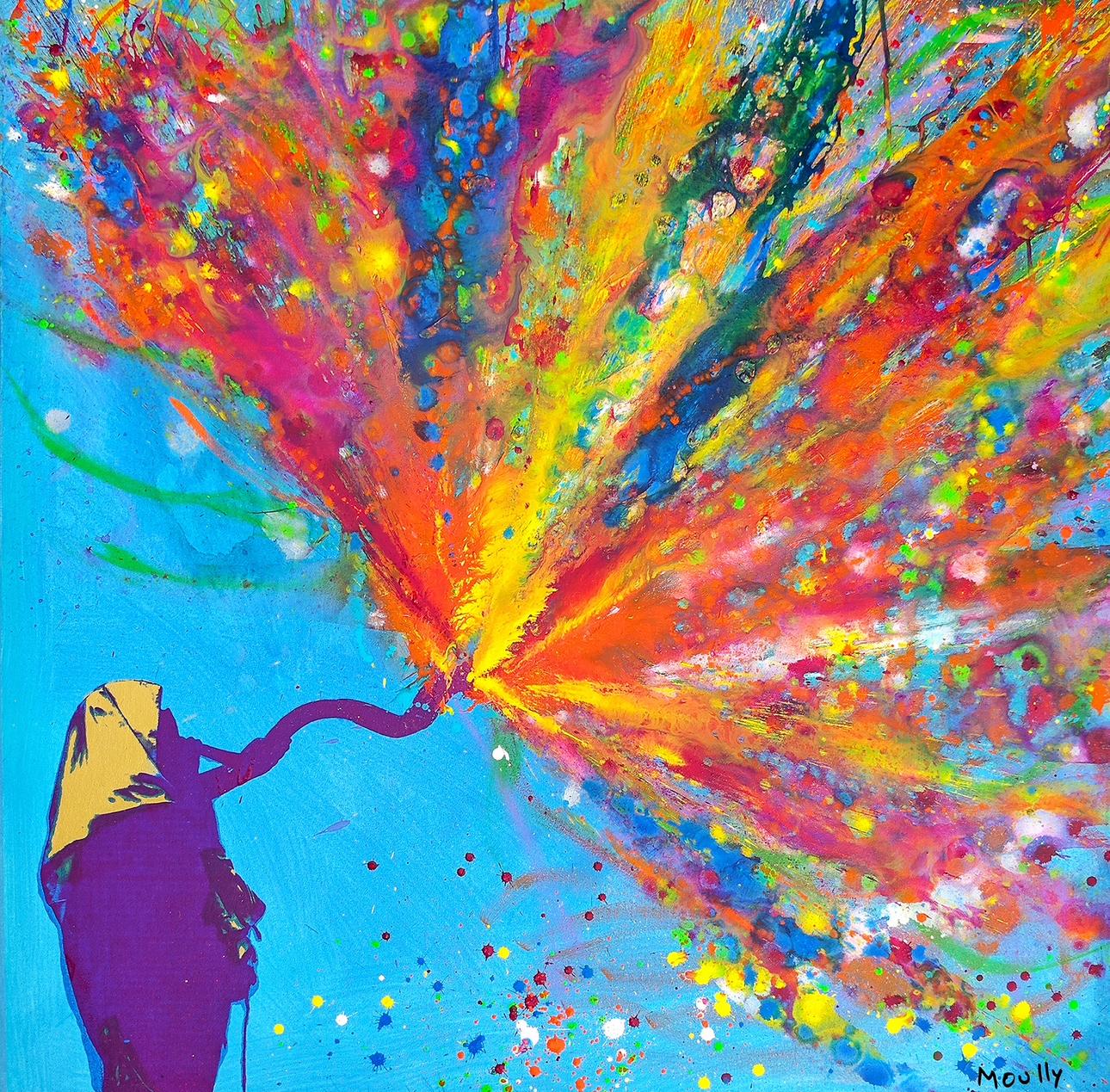
As the days grow shorter and the air takes on a crisp, autumnal feel, all of God’s people around the world (Jews and Gentiles) prepare to celebrate Yom Teruah, commonly known as Rosh Hashanah for the Jewish people and as the Feast of Trumpets in English. This vibrant festival marks the beginning of the Jewish New year and is distinguished by the powerful and evocative sound of the shofar (a ram’s horn traditionally blown on Rosh Hashanah). In Leviticus 23:23–25, the Lord establishes the Feast of Trumpets ( Yom Teruah): “The LORD spoke to Moses, saying, ‘Speak to the people of Israel, saying, In the seventh month, on the first day of the month, you shall observe a day of solemn rest, a memorial proclaimed with a blast of trumpets, a holy convocation. You shall not do any ordinary work, and you shall present a food offering to the LORD.’” This sacred gathering laid the foundation for what we now celebrate as Rosh Hashanah/Feast of Trumpets.
Take a look at the picture above. It features a person blowing a shofar, with vibrant colors streaming out. This artwork beautifully represents the feast’s lively and celebratory nature, reflecting the powerful sound of the Shofar and symbolizing the profound spiritual awakening and renewal of Yom Teruah.
Having celebrated the Feast of Trumpets for nearly a decade, I’ve witnessed firsthand how this sacred time prepares us for what God intends to do through us. The shofar, as a symbol of God’s protection and strength, reassures us that we are under His care. Just as the horn of an animal represents defense and power, the shofar symbolizes God’s safeguarding and victory.
The Shofar: More Than Just a Horn
Here are some of the profound ways the shofar resonates:
- A Royal Coronation
The sound of the shofar echoes the trumpet blasts that announce the coronation of a king. On Rosh Hashanah, we commemorate God’s creation of the world and His assumption of Sovereignty. The shofar’s call is a declaration of God’s reign, reminding us of His kingship. - A Call to Reflection
As the first of the Ten Days of Penitence, Rosh Hashanah is a time for self-examination. The shofar’s piercing call stirs our conscience, urging us to reflect on our past actions and seek repentance. It’s a reminder that God is always ready to welcome those who return with sincerity. - A Reminder of Sinai
The sound of the shofar at Rosh Hashanah also evokes the divine revelation at Mount Sinai, where the shofar’s blast accompanied God’s delivery of the Torah. It serves as a reminder of our commitment to the teachings and commandments of the Torah. - Prophetic Echoes
The shofar’s call can be likened to the voices of the prophets, who called out to their people to correct their ways and live righteously. It serves as a spiritual wake-up call, encouraging us to align our lives with divine expectations. - The Temple’s Destruction
The sound of the shofar also mourns the destruction of the Temple in Jerusalem. It’s a call to remember the loss and to strive for renewal and unity, both for Israel and in our relationship with God. - A Symbol of Sacrifice
As a ram’s horn, the shofar recalls the ram Abraham sacrificed in place of his son Isaac. This symbolizes the profound faith and devotion of our forefathers, setting a powerful example of commitment to God. - A Call to Humility
The shofar’s blast is a call to recognize our own humility in the face of God’s majesty. It reminds us to be mindful of our place in the grand scheme of creation. - Judgment Day
The shofar heralds the Day of Judgment, a time for all people and nations to prepare for God’s evaluation of their deeds. It’s a reminder of the ultimate accountability we hold before God. - A Foreshadowing of Redemption
The shofar anticipates the joyous day of freedom when Israel will return from exile to its homeland. It’s a call to maintain faith in God’s promises and the eventual restoration of peace. - The Coming of the Messiah
The shofar also symbolizes the future arrival of the Messiah, marking the end of the current world order and the beginning of an era of divine righteousness and global unity under God’s reign. As it says in 1 Corinthians 15:53, “It will happen in a moment, in the blink of an eye, when the last trumpet is blown. For when the trumpet sounds, those who have died will be raised to live forever. And we who are living will also be transformed.” - Spiritual Warfare
Beyond its symbolic meanings, the shofar serves as an alarm for spiritual battles, calling us to engage in the spiritual warfare necessary to uphold righteousness and faith. - A Call to Gather
The shofar also serves as a summons for people to assemble, uniting in purpose and spirit. - Opening and Closing the Gates
The shofar marks the opening and closing of spiritual gates, symbolizing opportunities for repentance and divine connection. - The Spiritual Impact
Listening to the shofar’s varied sounds can invoke a profound spiritual response. Each note carries a unique message, resonating deeply within our spirits and aligning us with its divine significance.
As we approach Rosh Hashanah during this month of Elul, we engage in repentance and spiritual preparation. By reflecting on our actions, seeking forgiveness, and donning the garments of righteousness, we ready ourselves for the profound significance of the coming day.
The Feast of Trumpets is not just a time of celebration but a powerful reminder of our ongoing journey toward spiritual renewal and divine connection. As we listen to the shofar’s call, may it inspire us to embrace its message and align our lives with God’s enduring purpose and prepare ourselves as a beautiful bride waiting for her bridegroom.
Happy Feast of Trumpets,
From us at Ambassadors of Yeshua
